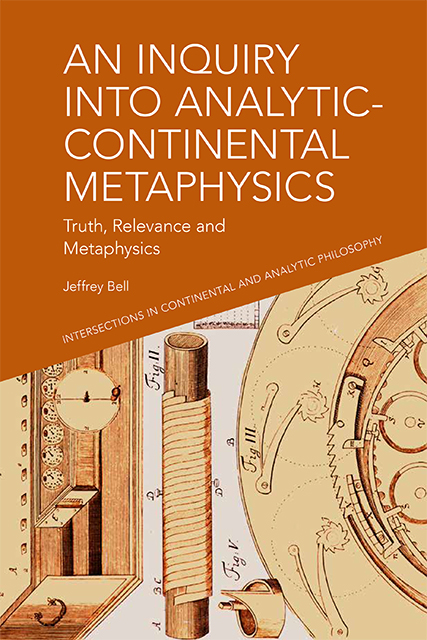Book contents
- Frontmatter
- List of Contents
- Acknowledgements
- Introduction
- §1 Problem of the New
- §2 Problem of Relations
- §3 Problem of Emergence
- §4 Problem of One and Many
- §5 Plato and the Third Man Argument
- §6 Bradley and the Problem of Relations
- §7 Moore, Russell and the Birth of Analytic Philosophy
- §8 Russell and Deleuze on Leibniz
- §9 On Problematic Fields
- §10 Kant and Problematic Ideas
- §11 Armstrong and Lewis on the Problem of One and Many
- 12 Determinables and Determinates
- 13 The Limits of Representational Thought
- 14 Learning from a Cup of Coffee
- 15 Carnap and the Fate of Metaphysics
- 16 Truth and Relevance
- Conclusion
- Bibliography
- Index
16 - Truth and Relevance
Published online by Cambridge University Press: 25 October 2023
- Frontmatter
- List of Contents
- Acknowledgements
- Introduction
- §1 Problem of the New
- §2 Problem of Relations
- §3 Problem of Emergence
- §4 Problem of One and Many
- §5 Plato and the Third Man Argument
- §6 Bradley and the Problem of Relations
- §7 Moore, Russell and the Birth of Analytic Philosophy
- §8 Russell and Deleuze on Leibniz
- §9 On Problematic Fields
- §10 Kant and Problematic Ideas
- §11 Armstrong and Lewis on the Problem of One and Many
- 12 Determinables and Determinates
- 13 The Limits of Representational Thought
- 14 Learning from a Cup of Coffee
- 15 Carnap and the Fate of Metaphysics
- 16 Truth and Relevance
- Conclusion
- Bibliography
- Index
Summary
1. Arbitrary Accounts and Infinite Regresses
A key approach that has been taken throughout this book has been to develop the implications of two related claims. First, it has been argued that an account, explanation or grounding that is arbitrary is not a real account, and as such it offers no explanation or grounding. We saw this first with Michael Della Rocca's arguments, following Bradley, that if we use A to account for the relationship between A and B, then this is an arbitrary account – why not B rather than A? – and as arbitrary the relationship is left unaccounted for. More recently we have seen Quine draw upon this argument in his critique of the analytic-synthetic distinction. An analytic statement, a statement that is true by definition, or come what may, could, with sufficient and radical enough revisions elsewhere in the web of beliefs, become a statement that is no longer true come what may. There is no non-arbitrary line to be drawn between analytic and synthetic statements, and hence the distinction itself is ungrounded and is therefore rejected by Quine. The second, related claim, is that an account or explanation which generates an infinite regress never provides the explanation or account it sets out to provide. If we attempt to ground the relationship between A and B in a unique quality shared by both A and B, and thus avoid the arbitrary account, we end up in the classic Bradley regress, for we now have a special relationship AB – this special quality that is related to both A and B – that now needs to be explained. If we appeal to yet another special relationship at this point to account for AB, then we are off on a regress and will never provide the explanation we sought. The Third Man Argument (TMA) is the most famous example of such a regress, and its problematic implications have long been recognised (e.g., by Plato in Parmenides [see §5.2]), as has been a guiding theme throughout this work.
2. Brute Facts or Spinozist Bullet?
Another theme that set the stage early on for much of what has been developed here is the arbitrary nature of a common solution to the regress problem – namely, the turn to brute facts and explanations that are self-sufficient and in no need of their own explanations.
- Type
- Chapter
- Information
- An Inquiry into Analytic-Continental MetaphysicsTruth, Relevance and Metaphysics, pp. 192 - 203Publisher: Edinburgh University PressPrint publication year: 2022

